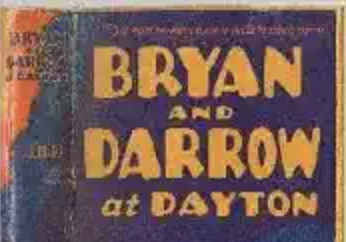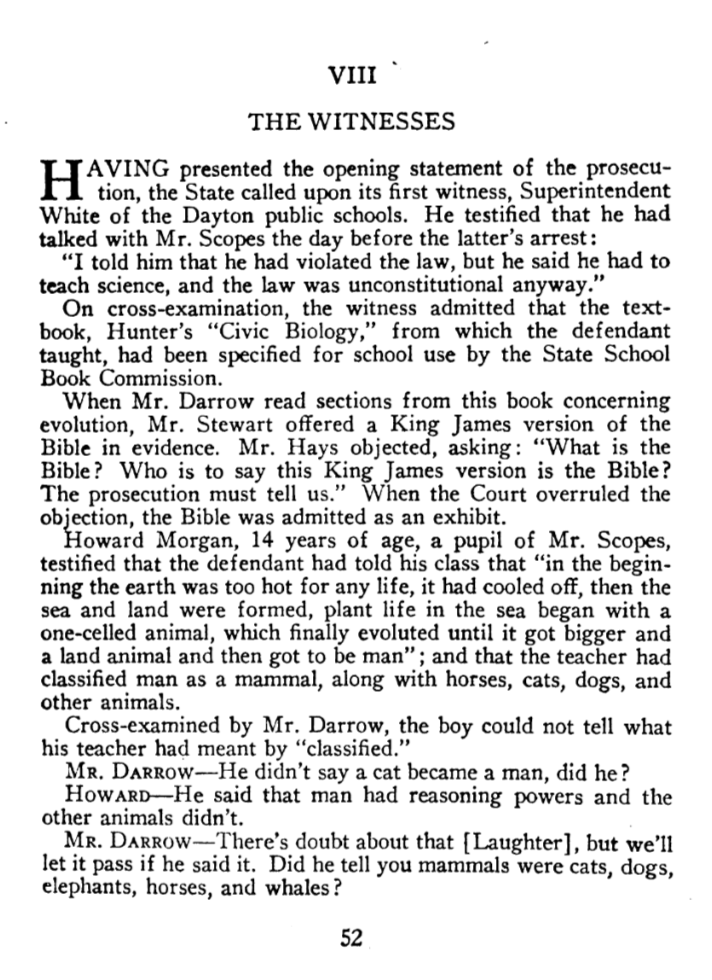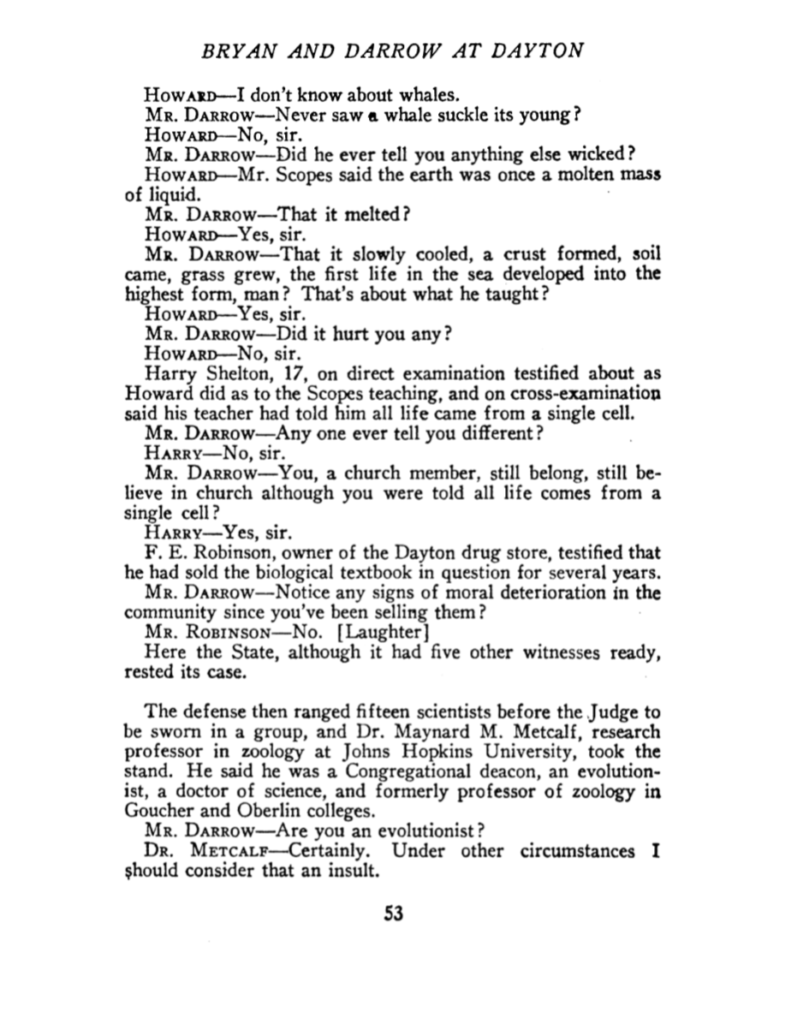Introduction
Towards the very beginning of 1925, the Tennessee state legislature approved a bill that banned the teaching of any theory that went against the story of Divine Creation, as taught in the Bible. John Scopes, a high school science teacher living and working in Dayton, Tennessee, agreed to be put on trial for violating the law in order to bring attention to its unconstitutional basis.
Throughout the trial, both Clarence Darrow, Scopes’ attorney, and William Jennings Bryan, the prosecutor representing the state of Tennessee, interviewed and cross-examined several witnesses. The document below features portions of Darrow’s cross-examinations of four witnesses, the superintendent of the high school, two of Scopes’ students, and an esteemed member of the community. The written transcript of the witnesses’ testimonies proves the absurdity of the Tennessee law and helps demonstrate why Scopes got off with the most inconsequential punishment for the crime. In regard to the larger narrative of the 1920s, this record demonstrates the transition in America from a country based on religious fundamentalism to one with secular beliefs and institutions.
Record of Witness Testimony Document
Document Text
VIII
The Witnesses
Having presented the opening statement of the prosecution, the State called upon its first witness, Superintendent White of the Dayton public schools. He testified that he had talked with Mr. Scopes1John T. Scopes (1900-1970) was a high school science teacher and football couch at Rhea County High School. Scopes agreed to be convicted of teaching evolution in his class not because he could recall doing so, but because he believed it over the story of Divine Creation. After the trial was over, Scopes left Dayton forever. the day before the latter’s arrest:
“I told him that he had violated the law, but he said he had to teach science2The science that Scopes wanted to teach was based on the theory evolution. As opposed to the religious theory, the theory of evolution "typically refers to the changes in the proportions of biological types in a population over time", as proposed by Charles Darwin., and the law was unconstitutional anyway.”
On cross-examination, the witness admitted that the textbook, Hunter’s “Civic Biology3Civic Biology, written by George William Hunter, was originally published in 1914. The state of Tennessee required that all high school teachers teach from this book even though it had a whole section dedicated to the theory of evolution.,” from which the defendant taught, had been specified for school use by the State School Book Commission.
When Mr. Darrow4Clarence S. Darrow (1857-1938) was a famous American lawyer. Before defending Scopes in 1925, Darrow established his fame with the Leopold and Loeb murder trial of 1924. He was brought on as Scopes defense lawyer by the American Civil Liberties Union. read sections from this book concerning evolution, Mr. Stewart5Arthur Thomas Stewart (1892-1972) was a Democratic U.S. Senator from Tennessee. During the trial, he helped lead the prosecution alongside William Jennings Bryan. offered a King James version of the Bible in evidence.6In 1604, King James I of England authorized a new translation of the Bible. The purpose behind this new version was to settle religious differences in his kingdom, thus solidifying his regime and power. Mr. Hays7Arthur Garfield Hayes (1881-1954) was the General Counsel for the American Civil Liberties Union. He worked alongside Darrow on Scopes' defense team throughout the trial. objected, asking: “What is the Bible? Who is to say this King James version is the Bible? The prosecution must tell us.” When the Court overruled the objection, the Bible was admitted as an exhibit.8An exhibit in court can be any document, object, and/or photograph that is introduced as evidence during a trial. In this case, the entire Bible was introduced as evidence.
Howard Morgan, 14 years of age, a pupil of Mr. Scopes, testified that the defendant had told his class that “in the beginning the earth was too hot for any life, it had cooled off, then the sea and land were formed, plant life in the sea began with a one-celled animal, which finally evoluted until it got bigger and a land animal and then got to be a man”; and that the teacher had classified man as a mammal, along with horses, cats, dogs, and other animals.
Cross-examined by Mr. Darrow, the boy could not tell what his teacher had meant by “classified.”
Mr. Darrow-He didn’t say a cat became a man, did he?
Howard-He said that man had reasoning powers and the other animals didn’t.
Mr. Darrow-There’s no doubt about that [Laughter], but we’ll let it pass if he said it. Did he tell you mammals were cats, dogs, elephants, horses, and whales?
Howard-I don’t know about whales.
Mr. Darrow-Never saw a whale suckle its young?
Howard-No, sir.
Mr. Darrow-Did he ever tell you anything else wicked?
Howard-Mr. Scopes said the earth was once a molten mass of liquid.
Mr. Darrow-That it melted?
Howard- Yes, sir.
Mr. Darrow-That it slowly cooled, a crust formed, soul came, grass grew, the first life in the sea developed into the highest form, man? That’s about what he taught?
Howard-Yes, sir.
Mr. Darrow-Did it hurt you any?
Howard-No, sir.
Harry Shelton, 17, on direct examination testified about as Howard did as to the Scopes teaching, and on cross-examination said his teacher had told him all life came from a single cell.
Mr. Darrow-Any one ever tell you different?
Harry-No, sir.
Mr. Darrow-You, a church member, still belong, still believe in church although you were told all life comes from a single cell?
Harry-Yes, sir.9It is important to recognize that although Howard's and Harry's testimonies did prove Scopes' guilt, it also demonstrated that there was no harm done to his students. This is important because the American people began to realize that actual science, like biology, could be taught in schools without harming the religious community.
F. E. Robinson10 F.E. Robinson was the owner of Robinson's Drugstore, the town's local drugstore. It was in this store that Dayton's businessmen met to discuss the possibility of brining such a controversial trial to town and asking Scopes to participate as the "criminal"., owner of the Dayton drug store, testified that he had sold the biological textbook in question for several years.
Mr. Darrow-Notice any signs of moral deterioration in the community since you’ve been selling them?
Mr. Robinson-No. [Laughter]
Here the state, although it had five other witnesses ready, rested its case.11Darrow had a unique strategy throughout the trial, to get the jury to find Scopes guilty. This gave Darrow an advantage when cross-examining witnesses because he wasn't trying to prove that Scopes was innocent. At this point, the state rested its case because Darrow's cross-examination proved Scopes' guilt.
Sources
- Allen, Leslie H. Bryan and Darrow at Dayton. The Record and Documents of the “Bible-Evolution Trial”. New York: Arthur Lee & Company, 1925.
- HathiTrust. “Bryan and Darrow at Dayton: the Record and Documents of the “Bible-Evolution Trial“. University of Michigan. Accessed April 2021.
Additional Sources
- American Civil Liberties Union. “State of Tennessee V. Scopes.” ACLU. Accessed April 2021.
- Millstein, Roberta L. “Evolution.” The Stanford Encyclopedia of Philosophy. 2019.
- PublicBroadcasting Service. “John Scopes.” American Experience, PBS. Accessed February 2021.
- “Tom Stewart.” Wikipedia. Last modified December 19, 2020.
- “Why the King James Bible of 1611 Remains the Most Popular Translation in History.” The History Channel. Last modified April 16, 2019.

Rachel is a junior at Ramapo College of New Jersey taking Discovering Digital History in the Spring of 2021. She is studying History and Education and is looking forward to becoming a teacher after graduating.



